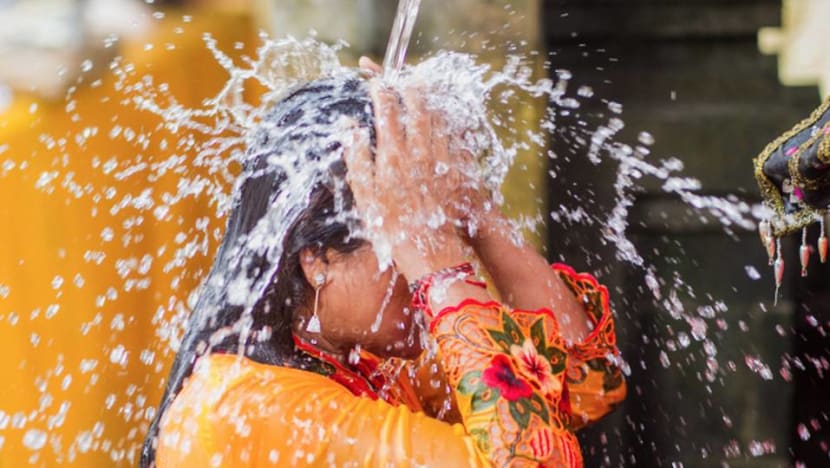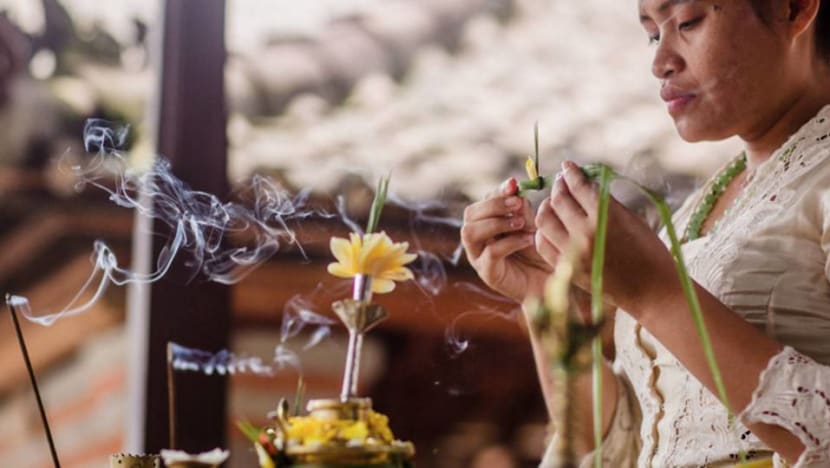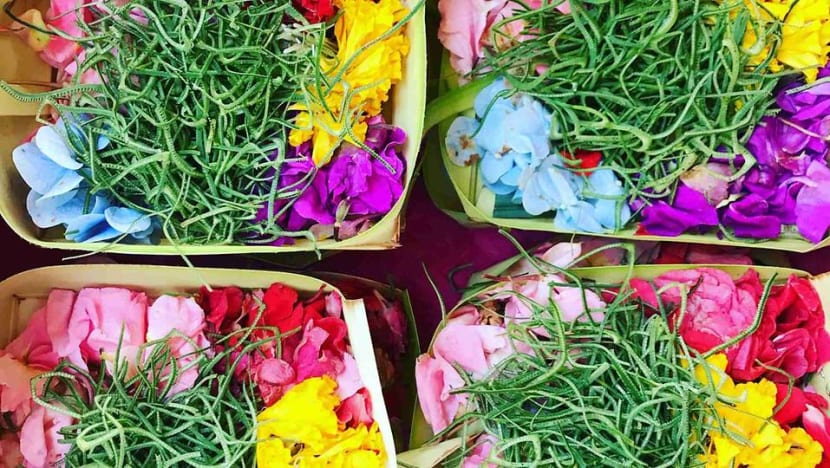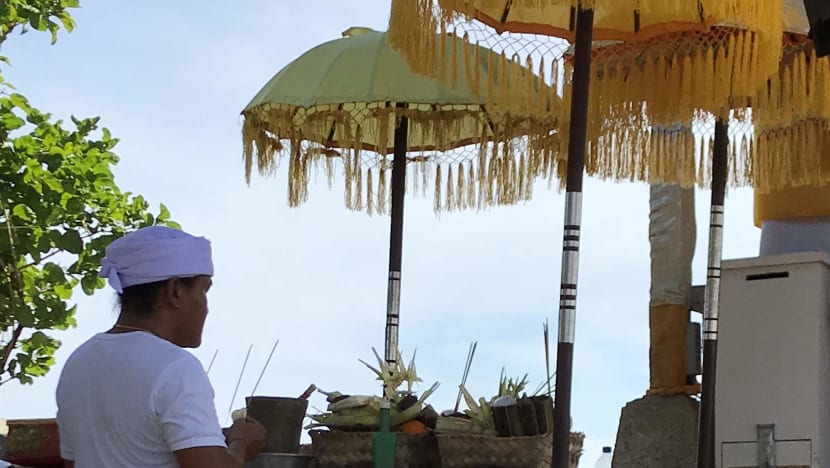Ritual delight: Taking a shower to cleanse your soul in Bali
A CNA Lifestyle contributor experiences the special Balinese water cleansing ceremony of melukat – as tourists whip out their handphones.

The soul-cleansing water ceremony of melukat in Bali. (Photo: Amankila Resort Bali)
BALI: Compact and dark brown with such kind eyes, the mangku murmurs something to me in Balinese.
“Lower your head!” our guide translates softly. “And close your eyes!”
Then, very gently, I feel a cool trickle of water streaming over my bent head. It’s such a refreshing balm against the hot Balinese sun. The mangku, a white-frocked temple priest, murmurs something again. I catch the scent of sweet jasmine.
Under my bare feet, the flagstones of Uluwatu temple burn; and around us, a small gaggle of fascinated tourists film us on their handphones. To our back is a low stone wall, the only thing that separates us from the foamed flecked surf of the sea below.

The cold water is a shock and in the sudden stillness, all the senses converge on this brief moment. The tourist chatter and the distant shrill squawks of the fleet-footed monkeys for which the temple is famed recede. Even the heat from the flagstones retracts its stinging touch. I feel only the cool water tickling down my hair and onto my face.
For a brief moment, there is only the gentle wash of water and the odd sensation of the world falling away. It’s as if I’m being cleansed – which, I suppose, is the whole point of the melukat, a ceremony in which blessed water is poured over the supplicant.
And then the world comes rushing back.
“Now drink. Three times!” the guide instructs, as the mangku pours water from a coconut into my cupped hands. Dutifully, I swallow the tepid, salty-sweet juice, even as I watch him dip two fingers into the sides of the fruit and scoop up some rice grains which he’d sprinkled in earlier along with flower petals and leaves. He presses these on my forehead.
In Bali, holy water traces its liturgical and theological roots from a simple two-line passage in the Bhagavad-Gita: If one disciplined soul proffers to me with love a leaf, a flower, fruit, or water, I accept this offering of love from him.”
Essentially, holy water is ordinary water that has been blessed and thus transformed into a divine state. It is revered for its ability to consecrate, cleanse and purify, and it forms the basis of just about every act and occasion in Hindu-Balinese worship – whether a christening, a cremation, the entry into a new home or the start a new job, or even the first step of a long journey.

Of course, not all holy water is created equally. Much depends on the source of the original water, who blesses the water, the location of the blessing and even the intended use of the water. Generally, the process involves a priest entering into a state of almost holy trance (the better to commune with, and channel the authority of, the gods) whilst chanting specific mantras over water drawn from a temple well or river. Infused with arcane rituals, the religious nuances of the blessing are completely incomprehensible to outsiders.
Once the water has been empowered with mystic power, it is ready to be used, and one of the most fundamental ceremonies in the Hindu-Balinese canon is the melukat.
The most sought after melukats are those performed by the island’s team of high priests and priestesses, of whom its most famous right now is Ida Maharesi Alit.
But because her sanctuary is located in central Bali and I was staying in the extreme south in Alila Villas Uluwatu, the resort arranged a private ceremony with the mangku priests at the nearby Uluwatu temple. Because of its precipitous location high on a cliff above the sea, it’s widely recognized as being infused with positive energy.

Here, in the inner shrine, closed off from the madding crowd that mills outside, the mangku blesses the water and preps the elaborate straw baskets of canang sari, or offerings comprising fronds and rice, and multi-coloured flower petals which represent the cardinal points of the compass.
The prayers and secondary blessings take place in this little courtyard, but the actual water cleansing is done outside the shrine so that it is not contaminated by the pilgrim’s negative energy and emotions that are washed away by the holy water.
Still dripping, I gingerly feel bits of rice and leaves and coloured flotsam stuck to my hair. “Leave it!” the mangku instructs. “When it all dries and falls off, then you can shower.”
Later, back in the quiet coolness of my villa at the Alila, the rice grains still anointing my forehead, I remember the shock of the first wash of holy water hitting my head, the chilled wave drenching the body, and the ensuing sensation of calm stillness.
Last year, when I had a melukat with Ida Maharesi Alit, she told me I should think of a melukat as taking a shower. “But instead of cleaning the body, the ceremony cleanses the soul. You don’t need a special reason for doing it. Come whenever you feel low.”
Yes, ma’am.















